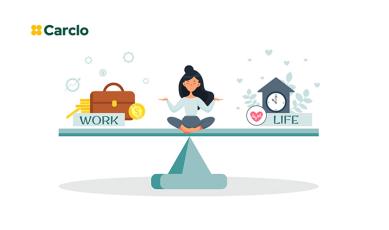
FOSTERING EMPLOYEE WELLBEING & WORK LIFE BALANCE
Carclo Aylesbury, UK
Hollie Evans, March ‘24
In today’s fast paced & sometimes demanding working environments, having an equilibrium between personal & professional responsibilities can be a struggle. For many companies worldwide, fostering employee well-being has now become a top priority to ensure individuals lead happy, healthy & fulfilling lives, both in the workplace & at home; commonly referred to as “the work life balance”.
Balanced well-being for employees translates into increased employee attraction & retention, increased productivity & performance, enhanced career satisfaction, enhanced well-being, decreased stress & burnout, & a more positive & vibrant company culture.
Some examples of how companies can achieve & show commitment to employee well-being are as follows:
· Employee benefits
· Flexible working arrangements with options for remote work & supporting technology
· Paid time off
· Wellness programs
· Family friendly benefits
· Training & development
· Regular team building activities
· Milestone celebrations
To promote a healthy work life balance, companies should set clear expectations & boundaries. By doing this, they create an environment that respects the personal lives of their employees, while ensuring productivity & efficiency during working hours. Some examples of how to achieve this are:
· Establishing realistic deadlines for tasks & projects allows employees to manage their time effectively. This will help to alleviate unnecessary stress.
· Encourage employees to openly discuss their workload, challenges & concerns with their supervisors & colleagues. By promoting an environment where employees feel comfortable expressing their needs or concerns, companies can make the necessary adjustments to ensure a more balanced approach.
· Discouraging work related activities during non-operational hours, including avoiding after-hours emails, calls, or assignments. Companies should encourage a culture that recognizes & values the importance of rest, relaxation, & personal commitments outside of work.
· Encourage employees to take regular breaks throughout the workday. Breaks not only allow individuals to recharge but also contribute to improved focus & productivity. Companies can promote this by providing designated break areas & even organizing activities that facilitate relaxation & stress reduction.
Company leaders & managers play a crucial role in fostering work life balance. Their actions & behaviors set the tone for the entire team & inspire others to prioritize their own work life balance.
Work life balance can not only be the solution to the negative consequences of work (pressure, stress, burnout), but it can also provide the key to unlocking creativity & innovation that will give your business, or your career, an advantage.
Remember! Work life balance is a continual process, not an achievement.


